Can Debt Consolidation Help Your Credit?

If you're feeling overwhelmed by multiple loans, high-interest credit cards, and due dates scattered throughout the month, you’re not alone. Debt can quickly become stressful and confusing. Fortunately, debt consolidation is a strategy that might help you regain control of your finances by combining everything into one, more manageable payment.
What is Debt Consolidation?
Debt consolidation is the process of combining multiple debts—such as credit cards, student loans, or personal loans—into a single debt with just one monthly payment. Often, this means taking out a new loan or using a balance transfer credit card to pay off all your other debts. Ideally, this new debt should come with a lower interest rate or a more convenient payoff structure.
Why does this help?
By having only one monthly due date and interest rate to keep track of, you reduce the hassle of juggling multiple payments. This strategy can also potentially lower the amount of interest you pay overall, especially if the new rate is lower than the rates on your current debts.
Common Forms of Debt Consolidation
- Balance Transfer Credit Cards
Move high-interest balances to a card with a promotional low or 0% APR. Be mindful of balance transfer fees (often 3-5% of the transferred amount) and the promotional period’s expiration date. - Upfront and Ongoing Costs
Some loans or credit cards charge application, origination, or balance transfer fees. These costs can eat into the potential savings you'd get from consolidating, so factor them into your calculations. - Payment Timeline
Even if consolidating reduces your monthly bill, you might end up paying more interest in the long run if the repayment term is extended. Make sure the timeline aligns with your financial goals. - Spending Habits
Debt consolidation will only help if you avoid accruing new debt. Build a realistic budget and work on sticking to it so you don't undo the progress you've made. - Collateral Requirements
Certain forms of consolidation, such as home equity loans, require you to put your home up as collateral. Weigh the risk of potentially losing valuable assets against the benefit of lower interest rates. - Professional Guidance
If you're not sure which option is best, consider talking to a financial advisor or credit counselor. They can offer personalized advice to help you pick the right consolidation path.
What are the Benefits of Debt Consolidation?
Makes Life Simpler Switching from multiple payments to one payment cuts down on paperwork and the risk of missing a payment.
Can Save Money on Interest If the new loan has a lower rate, you'll pay less in interest over the life of the loan.
Potential Credit Score Benefits Consolidation can help reduce your credit utilization across several accounts and, with consistent on-time payments, may boost your score over time.
Debt consolidation can be a powerful way to simplify your finances, lower overall interest costs, and ultimately help you get out of debt faster. However, it's not a one-size-fits-all solution. Be sure to evaluate your unique situation, credit score, and overall financial habits before deciding on a consolidation plan of action.
Ready to learn more? Contact Nuvision today to help find the best plan that aligns with your debt consolidation goals. By choosing the right tools and plan—and by sticking to a solid budget—you'll be well on your way to an empowered financial life and greater peace of mind.




